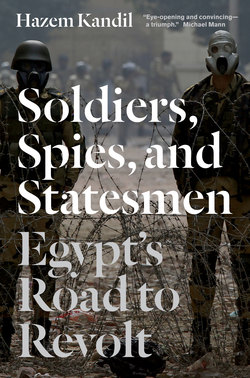Soldiers, Spies and Statesmen

Реклама. ООО «ЛитРес», ИНН: 7719571260.
Оглавление
Hazem Kandil. Soldiers, Spies and Statesmen
Отрывок из книги
Soldiers, Spies, and Statesmen
Egypt’s Road to Revolt
.....
Another mistake: Naguib rested too confidently on the fact that he had become an immediate sensation following the coup, and tried to preserve his folk-hero image by spending most of the period between 1952 and 1954 traveling around the country in a train (Truman style), galvanizing the masses through inspirational speeches. In that, he was enormously successful: “People lost control when they saw him, applauding, chanting, and throwing themselves on his car.”36 Considering popularity his main asset, the president wasted the efforts of his closest military associates on a trivial popularity-boosting campaign instead of planting them in the emerging security sector: Riyad Samy was hired as press secretary, and Muhammad Riyad was put in charge of protocol. He also flirted with the leaders of the Muslim Brothers, beginning from 1954, with the hope that garnering the support of the most popular force on the street would eventually help him send the officers back to the barracks and remain president under a liberal constitution.37 What the president failed to understand, in contrast to his sober rival, was that popularity was a mercurial asset that could evaporate as easily as it could be gained.
One of Naguib’s worst flaws, however, related to how he went about securing foreign support. As opposed to Nasser’s direct and aggressive campaign to build a security alliance with the United States, Naguib—too worried about tarnishing his reputation—preferred a more roundabout approach. Instead of relying on loyal officers, he encouraged the Muslim Brotherhood to endorse him in their discussions with the British and the Americans. Between May 1953 and January 1954, the Muslim Brotherhood representatives Munir Delah and Saleh Abu-Raqiq conducted two rounds of talks with Mr. Evans and Mr. Creswell of the British embassy, in which they mentioned that Naguib would be a better guardian of democracy.38 Those talks overlapped with another seven rounds with the Americans, between May and August 1953, in which the Brotherhood’s general guide, Hassan al-Hudaybi himself, participated. In one meeting, on June 4, the Brotherhood envoy Mahmoud Makhlouf tried to promote the president by claiming: “Naguib would be willing to sign a secret understanding with the US. The Moslem Brotherhood would support such a move. [But] Opposition might be encountered from Abdel Nasser.” On their July 17 meeting, the general guide relayed that he and Naguib supported the “withdrawal of the military from the government and their replacement by a coalition of ‘good men’ from the various political parties.”39
.....